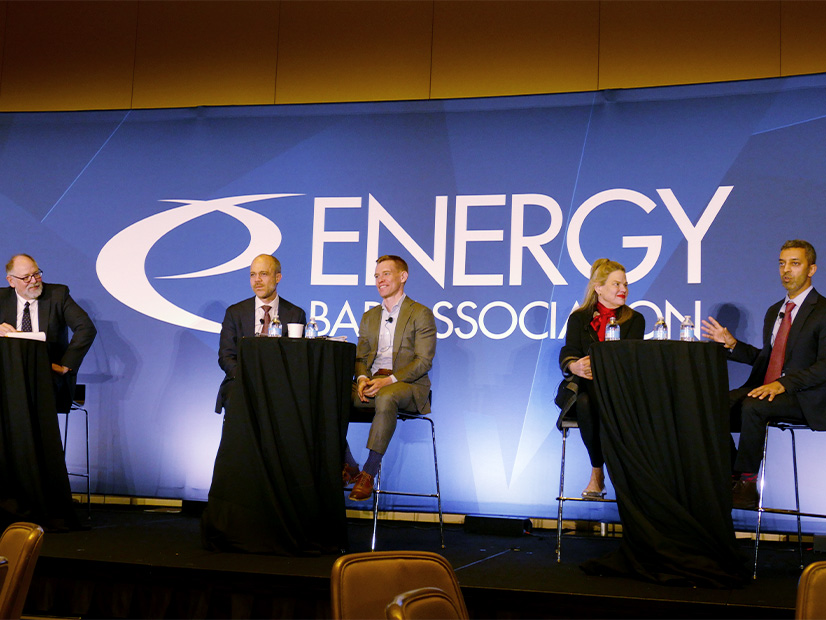
WASHINGTON — With the Supreme Court likely to overturn Chevron deference, the general counsels of FERC and the U.S. Department of Energy told the Energy Bar Association last week they doubt it would lead to massive issues with their agencies.
Under the doctrine, stemming from the 1984 case Chevron v. NRDC, if a statute’s meaning is unclear, and the agency’s action administering the law was reasonable, courts should defer to the agency. (See Supreme Court Hears Oral Arguments on Overturning Chevron.)
Chevron makes sense as a legal doctrine and provides judges with an easy way of affirming an agency’s decision-making when there is ambiguity in the law, FERC General Counsel Matthew Christiansen said at the EBA’s Annual Meeting. But underlying those decisions is some basic common sense being applied by the judges.
“Because I think that Chevron is largely deployed as a way of providing a compelling path to affirm an agency action, I’m not convinced that the loss of Chevron in many cases, if that is indeed what happens, is going to lead to wildly different outcomes,” Christiansen said. “I’m sure it’s going to lead to different outcomes on the margins. But at the end of the day, I’m a big believer in agencies’ ability to still put forth compelling justifications.”
Chevron has provided a lot of value over the decades, but the politics have reversed completely since it was first decided, DOE General Counsel Samuel Walsh noted. The late Justice Antonin Scalia, a textualist, was a big fan of the doctrine, and Justice Clarence Thomas authored the Brand X decision in 2005 that extended deference to the Federal Communications Commission and kept internet service providers from being regulated as common carriers.
“Some of the most important Chevron cases were cases where agencies were using the flexibility afforded by deference to regulate in a more light-handed way, or maybe not at all,” Walsh said.
The biggest area where DOE might be affected by the change in precedent would be on its ability to set efficiency standards for electric appliances, he said.
“But to my knowledge, we’ve only been upheld at Chevron Step 2 once,” Walsh said; Step 1 is deciding whether the law’s intent is clear from the text. “We’ve done hundreds of rules over the last four decades, and I think we’ve only benefited from it in a clear and explicit way once.”
DOE has benefited from the law more in its other functions such as litigation around nuclear waste storage in the 1990s and in litigation against the federal power marketing administrations it oversees. The law that governs sales from federal dams specifically calls “municipalities” preferred customers, so in the early 1990s, some “clever” city governments asked the Western Area Power Administration to sell them cheap electricity, Walsh said. WAPA argued that the term “municipalities” meant municipal utilities, and Chevron helped it carry the day in court.
Based on how the oral arguments went and other cases before the court, Victoria Nourse, a professor at the Georgetown University Law Center, said she thought Chevron deference would be overturned, as would the Skidmore deference that was used before Chevron was decided. The 1944 decision held that courts should defer to agencies’ interpretation of a statute as long as they essentially show their work.
“There were a lot of negative comments by Justice [Brett] Kavanaugh, who is very, very powerful and influential in statutory interpretation,” Nourse said. “A lot of the disruption is going to come because there are also FERC and other agency models that they may not consider. They’ll probably have a safety valve.”
Hopefully, she added, that safety valve allows courts to give some credence to agency expertise on areas where engineers and scientists are bigger experts than lawyers ever could be.
“This is a court that is a full employment bill for lawyers … because your clients can now challenge regulations, not only because they don’t meet the best interpretation; anything that ever relied on legislative history is a no-no up there, and if it was Chevron,” Nourse said.
Several of the appeals circuits lean so far on one side of the political spectrum that litigants now regularly engage in “forum shopping” by picking the circuit where their arguments are most likely to win out, Walsh said. Losing Chevron would only exacerbate that trend.
While the combination of polarized courts and the lack of deference to agencies could create significant issues for some parts of the government, Christiansen downplayed the risks in the electric and natural gas markets. Many of the major regulations FERC has issued have vastly influenced the industries it oversees.
“Maybe I’m overly optimistic, too sanguine,” Christiansen said. “I’m not terribly concerned those foundational precedents that I think are the bedrock for the way the industry operates now are at great risk.”



